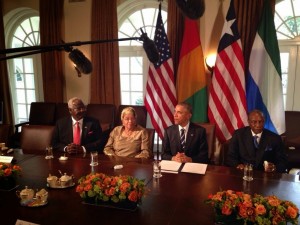While we can take pride in what has been accomplished, our work is far from finished. West Africa is still at risk of a re-emergence of Ebola and other infectious disease threats. In addition, the people of Liberia, Sierra Leone, and Guinea have disproportionately suffered from secondary economic and health effects. Rates of malaria, vaccine preventable illnesses, and unsafe child births are worse. And thousands of orphans and Ebola survivors are working to rebuild their lives in the wake of the Ebola crisis.
The United States and our partners will continue to support the Ebola affected countries in several ways: First, we will remain vigilant against Ebola and other infectious disease threats. We are supporting all three countries to build and maintain strong surveillance, laboratory, and rapid outbreak response systems for Ebola. The U.S. government stands ready to help respond to any new cases of Ebola and continues to work with the governments of the affected countries and partners to sustain the gains made by building local capacity.
Second, we are working with the governments of Guinea, Sierra Leone, Liberia, and other partners in the region and around the world to develop long-term capacity to prevent, detect, and respond to infectious disease threats through the development of five year plans to achieve all targets of the Global Health Security Agenda. The United States has committed to assisting at least 30 partners achieve these goals, starting in West Africa. Third, we are working closely with all three governments and with other partners to rebuild economies and assist the economic recovery of the region.
For example: On November 2, our Millennium Challenge Corporation (MCC) and the government of Liberia signed a $257 million compact that combines infrastructure investments with policy and institutional reforms designed to modernize the country’s power sector and strengthen its road maintenance systems. MCC’s investment complements efforts to help Liberia recover from the Ebola outbreak, significantly enhances the U.S. government’s Power Africa engagement in Liberia, and supports two sectors critical for broad growth.
On November 17, the MCC and the Republic of Sierra Leone signed a new $44 million Threshold Program—through which the M C will support policy reforms, build institutional capacity, and improve governance in the water and electricity sectors. The partnership comes as Sierra Leone emerges from the devastating Ebola outbreak and complements economic recovery efforts.
The U.S. government and United Nation partners are helping families recover from the economic effects of the crisis by helping to meet household food needs while encouraging school attendance by providing daily hot meals in schools in the most Ebola-affected areas—meals have been provided to about 120,000 children. Girls who attend school are provided with a take-home ration of vegetable oil to encourage attendance. Last quarter, food vouchers were provided to 10,000 beneficiaries in the region.
And finally, the U.S. government is supporting the overall restoration of basic health services in the Ebola affected region. For example: In Liberia, we are supporting basic health services in six counties, including the procurement and distribution of essential medicines to community clinics and supporting national catch-up immunization campaigns to prevent five diseases. We have supported a measles vaccination campaign at the county, district, and community levels in Lofa and Margibi counties.
In Sierra Leone, the U.S. government is partnering with other donors to procure and distribute essential life-saving medicines and health supplies to clinics around the country and to restore functional capability to key parts of the health sector supply chain of Sierra Leone that were damaged heavily by the effects of Ebola. Activities will reach nearly 3 million residents in the hardest hit districts, including Bombali, Port Loko, Western Area Urban, and Western Area Rural.
In Guinea, the U.S. government is supporting the restoration of basic health services at 112 facilities. U.S. government partners are also providing training for health care workers in hospitals and clinics on infection prevention and control protocols, including the use of personal protective equipment (gloves, gowns, masks), procedures for isolating patients who many have an infectious illness, and the safe management of laboratory samples. These measures will help prevent the spread of Ebola or other communicable diseases and improve patient care at health facilities.
As we celebrate the occasion of no new Ebola cases in West Africa, the United States is committed to standing with Guinea, Liberia, and Sierra Leone now, and into the future.
Source: Leadership Online

 The world has now gone over 40 consecutive days without a single reported Ebola case. Here’s how we helped make that possible For the first time since this outbreak was detected in West Africa in early 2014, the world has now gone over 40 consecutive days without a single reported Ebola case. The World Health Organization (WHO) announced that Guinea has successfully halted Ebola transmission and now joins Sierra Leone and Liberia in recovering from this devastating disease. This represents a significant milestone for Guinea, West Africa, and the international community.
The world has now gone over 40 consecutive days without a single reported Ebola case. Here’s how we helped make that possible For the first time since this outbreak was detected in West Africa in early 2014, the world has now gone over 40 consecutive days without a single reported Ebola case. The World Health Organization (WHO) announced that Guinea has successfully halted Ebola transmission and now joins Sierra Leone and Liberia in recovering from this devastating disease. This represents a significant milestone for Guinea, West Africa, and the international community.




